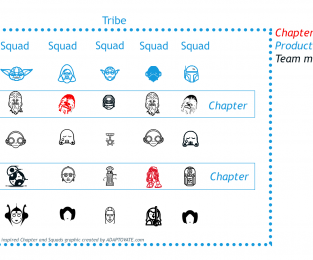By investing in Agile Coaching, you can find out more about how you can incorporate the 4 values of Agile into your workplace.
It starts with Agile
The key to understanding Agile is to first understand the meaning of Agile originally.
If you haven’t done so already, head to What is Agile? A Comprehensive Guide to find out exactly what you need to know of the origins of Agile.
Already up to date? Let’s get into it.
How Agile Manifesto began
Twenty one years later, what is valued and the principles still hold true. However, they have also evolved and gained more clarity to allow many organisations to successfully apply them to their environments within software and also in all parts of business, product and service development.
It’s important to know that these approaches on the bottom row are not necessarily bad—they are, in fact, quite necessary at times. What this visual show us is that as much as possible we should strive for the approaches on the top row, as they will allow teams to deliver more value, faster.
Let us think about what each of these initial comparisons, pulled from The Agile Manifesto, is really telling us to emphasise.
Agile organisations value and prioritise the following:

The 12 Agile Manifesto Principles
These principles form the basis of the Agile Manifesto written in 2001. As the Agile Manifesto was written by software developers, the initial principles relate mostly to software development. The Agile Manifesto states “We are uncovering better ways of developing software by doing it and helping others to do it”.
Where software is mentioned in these principles, organisations now understand that any product, service or user experience can be developed or improved by adopting these guiding principles.
There are 12 principles of agile working. These are:
- Customer satisfaction is the highest priority
- Change is welcome
- Working software is delivered frequently
- Close, daily cooperation between business people and developers
- Projects are built around motivated individuals
- Continuous attention to technical excellence and good design
- Regular adaptation to changing circumstances
- Simplicity–the art of maximising the amount of work not done–is essential
- Self-organising teams deliver the best results
- At regular intervals, the team reflects on how to become more effective, then tunes and adjusts its behaviour accordingly
- The team continuously improves its development process
- Agile processes promote sustainable development

Agile processes harness change
Agile processes including planning, focusing on delivery within short time frames called sprints and conducting retrospectives of our work to seek improvement apply the agile principles in practice.
With Agile Consulting, you can learn how to incorporate these values into your workplace for a more productive and efficient team.
A final note
Agile frameworks, when implemented well, enable organisations to rapidly adapt to landscape changes within an industry.
As such, Agile organisations have continued to thrive amidst the tumult caused by COVID.
Companies operating with Agile models and teams operating with an Agile mindset allowed for Agile-forward companies to best survive the COVID crisis.
So the very values and principles that originally underpinned Agile, have allowed for reinterpretations in these times of what Agile can be.
If you would like to find out more about Agile and your business, you can get in contact with our team.
Global insights
In order to understand the world around us and make informed decisions, it is important to have a global perspective.
Locations
USA
AUSTRALIA & NEW ZEALAND
Sydney
Simpson House, Level 5, 249 Pitt Street
Sydney NSW 2000
+61 2 7200 2530
Melbourne
L20, 15 William Street,
Melbourne VIC 3000
+61 2 7200 2530
Auckland (Tāmaki Makaurau)
Level 4, ACS House, 3 Ferncroft Street,
Grafton, Auckland 1010
New Zealand
SINGAPORE
3 Temasek Avenue #18-01 Centennial Tower
Singapore 039190
+65 98348486
POLAND
ul. Czackiego 15/17
00 -043 Warszawa
+48 505 626 416
CANADA
110 Cumberland Street Suite # 307
Toronto Ontario M5R 3V5
Canada
+1 647 631 1205
UK
5th Floor, 167-169 Great Portland Street
London W1W 5PF
+44 20 3603 1662

About us
Key Approaches
Industries
Trending Topics
©2022 ADAPTOVATE. All rights reserved










